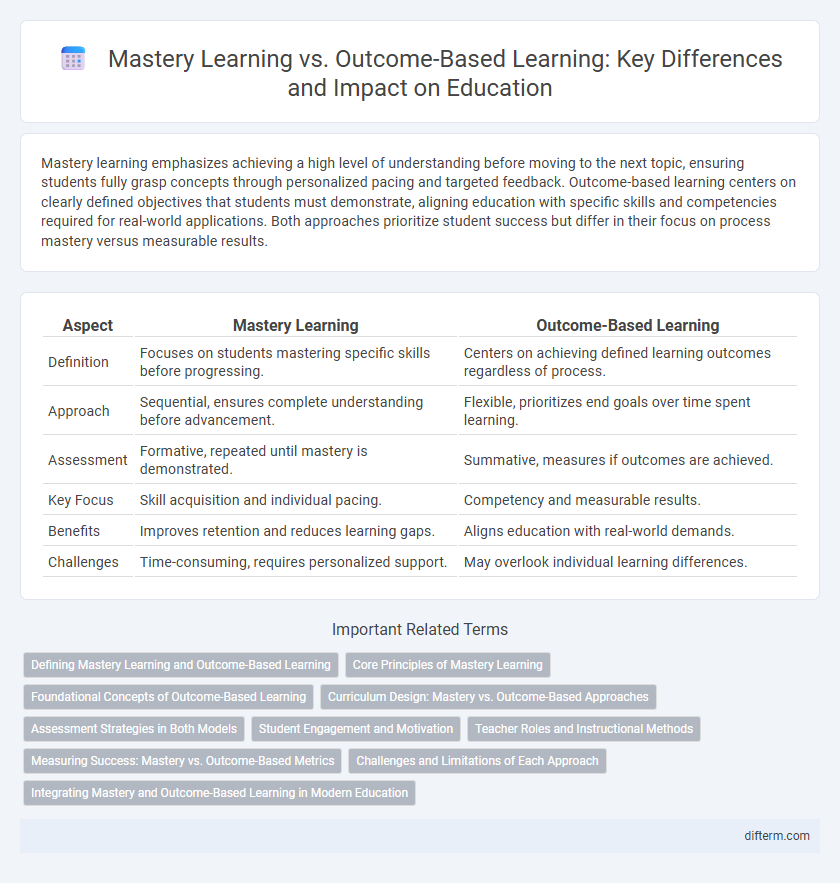Mastery learning emphasizes achieving a high level of understanding before moving to the next topic, ensuring students fully grasp concepts through personalized pacing and targeted feedback. Outcome-based learning centers on clearly defined objectives that students must demonstrate, aligning education with specific skills and competencies required for real-world applications. Both approaches prioritize student success but differ in their focus on process mastery versus measurable results.
Table of Comparison
| Aspect | Mastery Learning | Outcome-Based Learning |
|---|---|---|
| Definition | Focuses on students mastering specific skills before progressing. | Centers on achieving defined learning outcomes regardless of process. |
| Approach | Sequential, ensures complete understanding before advancement. | Flexible, prioritizes end goals over time spent learning. |
| Assessment | Formative, repeated until mastery is demonstrated. | Summative, measures if outcomes are achieved. |
| Key Focus | Skill acquisition and individual pacing. | Competency and measurable results. |
| Benefits | Improves retention and reduces learning gaps. | Aligns education with real-world demands. |
| Challenges | Time-consuming, requires personalized support. | May overlook individual learning differences. |
Defining Mastery Learning and Outcome-Based Learning
Mastery learning is an educational approach focused on ensuring students achieve a high level of understanding in a subject before progressing to the next topic, emphasizing individualized pacing and repeated assessments. Outcome-based learning centers on clearly defined objectives and measurable skills or competencies that students must demonstrate by the end of the course or program. Both frameworks prioritize student success, but mastery learning targets deep comprehension, while outcome-based learning emphasizes tangible, assessable results aligning with specific educational goals.
Core Principles of Mastery Learning
Mastery learning emphasizes individualized pacing and ensuring students achieve a high level of understanding before progressing, focusing on formative assessments and targeted feedback. It prioritizes student mastery of specific skills or knowledge areas through iterative learning cycles, allowing remediation and reinforcement. Core principles include clear learning objectives, diagnostic assessments, and mastery criteria that guide instruction and mastery verification.
Foundational Concepts of Outcome-Based Learning
Outcome-Based Learning focuses on clearly defined goals that students must achieve, emphasizing the mastery of specific skills and knowledge through measurable outcomes. This approach prioritizes student-centered instruction, ensuring learners demonstrate competence before progressing, unlike traditional time-based models. Foundational concepts include defining explicit learning outcomes, continuous assessment, and aligning curriculum, teaching, and evaluation methods to ensure effective skill acquisition and application.
Curriculum Design: Mastery vs. Outcome-Based Approaches
Curriculum design in mastery learning emphasizes incremental skill acquisition and ensures students achieve a high level of proficiency before progressing to new content, fostering deep understanding and retention. Outcome-based approaches focus on clearly defined learning outcomes aligned with real-world competencies, guiding curriculum development to meet specific educational goals. Integrating both approaches can optimize curriculum effectiveness by balancing skill mastery with measurable performance indicators.
Assessment Strategies in Both Models
Mastery learning emphasizes frequent formative assessments to ensure students achieve a high level of understanding before progressing, utilizing personalized feedback and corrective instruction. Outcome-based learning centers on summative assessments aligned with clearly defined competencies and measurable outcomes to evaluate student performance at the end of learning periods. Both models employ assessment strategies that guide instruction and measure learning effectiveness, but mastery learning prioritizes ongoing diagnostic assessments while outcome-based learning focuses on final competency verification.
Student Engagement and Motivation
Mastery learning emphasizes student engagement by ensuring learners fully understand each topic before moving forward, fostering intrinsic motivation through a clear sense of progress and competence. Outcome-based learning drives motivation by aligning educational objectives with measurable goals, encouraging students to take ownership of their achievement in real-world contexts. Both approaches enhance motivation, but mastery learning creates sustained engagement through personalized pacing, while outcome-based learning motivates by clarifying expectations and success criteria.
Teacher Roles and Instructional Methods
In mastery learning, teachers act as facilitators who provide personalized pacing and corrective feedback to ensure students achieve a high level of understanding before progressing. Instructional methods emphasize formative assessments, scaffolding, and targeted interventions to address individual learning gaps. Outcome-based learning requires teachers to design curriculum and instruction focused on achieving specific competencies and measurable goals, using authentic assessments and standardized evaluations to gauge student success.
Measuring Success: Mastery vs. Outcome-Based Metrics
Mastery learning emphasizes measuring success through individual student proficiency on specific skills before progressing, ensuring deep understanding and retention. Outcome-based learning assesses achievement by comparing student performance against predefined competencies or goals, focusing on whether learning objectives are met. Both approaches utilize assessment data, but mastery relies on formative evaluations for tailored pacing, while outcome-based employs summative assessments aligned with standardized benchmarks.
Challenges and Limitations of Each Approach
Mastery learning faces challenges such as requiring extensive time and resources to ensure all students achieve proficiency before moving forward, potentially slowing curriculum pace. Outcome-based learning struggles with limitations including the risk of emphasizing measurable results over deeper understanding and the difficulty in defining comprehensive outcomes that capture complex skills. Both approaches may encounter resistance from educators accustomed to traditional methods, complicating implementation and consistency across diverse learning environments.
Integrating Mastery and Outcome-Based Learning in Modern Education
Integrating mastery learning with outcome-based learning in modern education enhances personalized instruction by ensuring students achieve specific competencies before advancing, while aligning learning activities with clear, measurable outcomes. This approach fosters deeper understanding and skill acquisition by combining mastery's emphasis on individual pacing with outcome-based frameworks' focus on demonstrating proficiency in predefined objectives. Educators can leverage data-driven assessments and adaptive learning technologies to create tailored learning pathways that meet diverse student needs and improve overall educational effectiveness.
Mastery learning vs Outcome-based learning Infographic

 difterm.com
difterm.com